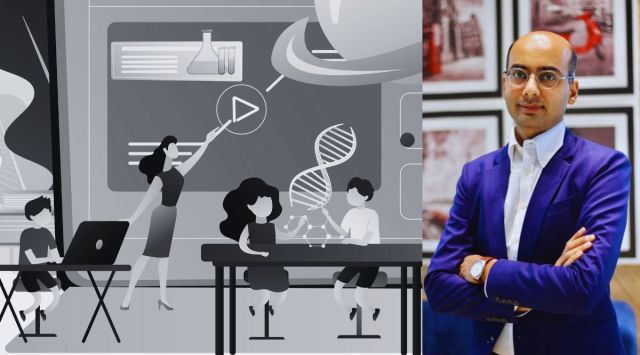
“They were simply memorising facts, figures, and procedures so that they could score more marks in their exams. There is nothing wrong with getting more marks in a good exam, but there was a need for understanding and application,” Kothari said, adding that this realisation led them to introduce Ei Asset, a product designed to test the scholastic skills of students’ conceptual clarity in English, Maths, Science, Social Studies, etc. By 2009, over five million students took Asset exams, giving the company deeper insights into the common misconceptions and gaps in learning.
“There were more than five million students who had written those assessments, and we were able to get on top of the misconceptions of students both grade-wise and subject-wise. This is when we built an adaptive learning software called Mindspark and started selling it to schools,” he said.
What is Mindspark?
Armed with ample data, Ei introduced Mindspark in 2010. This tool could offer personalised learning experiences to students based on their specific needs, based on what the company says is “a strong pedagogical foundation”. On the platform, by selecting a character, for instance, a panda named Leo, the output was a short story written in the most lucid and endearing manner. The platform also gives personalised writing feedback, gently correcting the mistakes in the text while encouraging the user to keep writing.
 Mindspark platform has an intuitive interface that prompts children to exercise their imagination. (Express Image/Ei)
Mindspark platform has an intuitive interface that prompts children to exercise their imagination. (Express Image/Ei)
“Even the best teacher cannot provide feedback like this one instantly, and certainly cannot do it during summer vacations. But Ei is available on mobile phones/laptops. You can literally imagine children anywhere in the world reading stories, writing essays, and getting feedback at a time of their choice. Everything is instantaneous here,” he said.
 Mindspark lets children generate stories on their own with characters and settings of their choice. (Express Image/Ei)
Mindspark lets children generate stories on their own with characters and settings of their choice. (Express Image/Ei)
Is it safe to leave children in the care of AI?
Asked how safe the platform was, Kothari explained that Ei has implemented the necessary guardrails on Mindspark to prevent inappropriate content, misinformation, and even over-reliance on AI. The platform, according to Kothari, has been thoughtfully trained on pedagogical datasets. He cited the example of Khan Academy videos, whose platform ensures that students only get access to the intended content and are not exposed to any vulnerabilities.
Story continues below this ad
“The peril that I see of AI is essentially that it also has inappropriate content. There is misinformation and bias because AI is generating more and more content now. In fact, ChatGPT is known to hallucinate. We have put GPT4 within Mindspark in a way that these sorts of issues don’t come up,” he said.
Will AI replace teachers?
Asked if AI will impact teachers in any way, Kothari shared that the response of teachers to AI is similar to the fears they had when technologies like smartphones and social media came to the fore. AI, he said, should play a complementary role to human teachers by automating tedious tasks like grading, allowing them more time to focus on significant activities like remediating and inspiring students to perform. According to Kothari, one of the key aspects of EI’s approach is incorporating teachers and schools into the learning process and not bypassing them in any way. “We want to work with the system, with the Principal, with the teachers, with the existing piece. We do not want to be yet another outsider.”
Kothari said Ei is committed to expanding access to high-quality education. The company offers products in 11 languages covering nearly 75 per cent of India’s population. Besides, with initiatives such as Ei Shiksha, the company is working with low-income government schools to improve learning outcomes. “The quality of education that a child gets should not be an outcome of their family’s status or wealth. It should be available to everyone because education is the best equaliser,” Kothari said.
Ei combines technology, pedagogy, and a mission to transform rote learning. Kothari believes there is much work still to be done. “Solving this problem might take another 20-30 years. We are here for the long run,” he said. The company has deployed AI for improving assessments, feedback loops, and personalised learning to reach the goal of making India a place where children learn with understanding.



 Mindspark platform has an intuitive interface that prompts children to exercise their imagination. (Express Image/Ei)
Mindspark platform has an intuitive interface that prompts children to exercise their imagination. (Express Image/Ei) Mindspark lets children generate stories on their own with characters and settings of their choice. (Express Image/Ei)
Mindspark lets children generate stories on their own with characters and settings of their choice. (Express Image/Ei)





